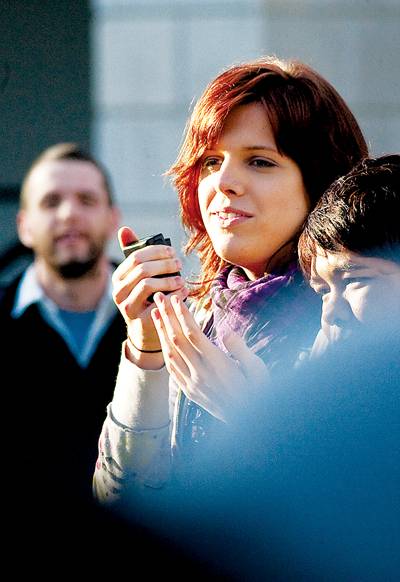PRELL: Defining marriage

Sophie Prell speaks during a rally in support of the recent unanimous Iowa Supreme Court decision in favor of same-sex marriage on Friday in the free-speech zone in front of Parks Library. Photo: Manfred Strait/Iowa State Daily
April 6, 2009
Marriage.
It’s a word shared by both the sacred and the secular, the religious and profane, the worldly and the other-worldly. And now, thanks to the unanimous Iowa Supreme Court ruling, it is about to be shared with a people who had been denied the right for too long.
But why the word marriage? Is that even what this is really about?
“What you get from the government is a civil union — a contract. It’s just stupid that they’re calling it marriage,” said Mark McCormick, senior in political science. Mark continued, explaining that plenty of people and religious institutions are happy to perform marriages for gay couples, or at the very least, welcome LGBT people into their congregation openly.
And Mark isn’t kidding. Literally thousands of Christian churches in the United States are considered “gay-friendly,” and some even reside right here in Ames. Gaychurch.org lists eight, those being the Ames Mennonite Church, Collegiate Presbyterian Church, Collegiate United Methodist Church, First Christian Church, First United Methodist Church of Ames, Lord of Life Lutheran Church, Northminster Presbyterian and University Lutheran Congregation.
I see this as a great and wonderful thing. Christians using their faith as a platform upon which they can stand and proudly declare that their beliefs are their motivation?
Oh yeah. I can definitely get behind that.
I know some supporters of same-sex marriage have become angry and bitter towards those with religious beliefs, believing that the religious — Christians especially — are our enemies. To them I proudly point to the aforementioned list and say quite plainly,
“No. You’re wrong.”
And that special word, “marriage”? Why it needs to be a certain way? Why that definition is so special? Well, I hate to be redundant as I’m sure everyone and their mother has heard this argument, but honestly, it’s about all that you’ll find on the lips of same-sex marriage opponents: “Marriage has always been defined as between a man and a woman.” There are other arguments they propose, but this is the only answer I could find that dealt directly with definitions. It was echoed time and time again by countless students unhappy with the court’s decision.
But how accurate is that argument? Well … not very.
At the onset of Christianity, sex was seen as one of the most vile acts humans could commit and it was acceptable only for procreation. Therefore, marriage was seen as a means to an end and often nothing more. Ancient Hebrew law also gave explicit rules for marriage, such as the duty of a brother to marry his deceased kin’s widow. That would make marriage non-consensual — which it often was in ye olden days — and is something I highly doubt people arguing for the “traditional” form of marriage would support.
Marriage also once meant defining a woman as property, as signing a marriage license would also require a woman to sign away her rights to owning property, signing contracts and keeping any money she earned. And lest we forget, mixed-race marriages were illegal in America until 1967. California was the first state to recognize such unions, but it was almost two decades before the nation as a whole embraced such “re-defining” of marriage.
It is interesting how easily parallels can be drawn between that historic decision and today. “Gay people already have the same rights,” argue many same-sex marriage opponents. “They can marry anyone of the opposite sex just like I can.” True, but this was the case in Loving v. Virginia as well. Any black person could marry someone of the same race, just like whites could do. Besides, if you’re worried about “tainting” the institution of marriage, do you really want gay people to get straight marriages? I would think simple logic would point that such rhetoric is self-defeating.
Oh, and the Supreme Court’s decision in Loving v. Virginia?
“Marriage is one of the ‘basic civil rights of man.’”
Read that one more time, and let it sink in. Marriage: A basic. Civil. Right.
For those who disagree with same-sex marriage, no one is going to force you to accept gay people. No gays are going to run streaming rainbow ribbons into your church as they chatter about the absolutely dreadful color scheme and how “ssssuper!” they could make it. You can think whatever you wish of the LGBT community.
But you don’t get to infringe on basic civil rights.
And if you’re concerned about the denigration of the American family? If you’re worried that gays are going to corrupt and destroy the “traditional” structure as we know it? If you think that our nation’s supposedly slippery morality is causing this downfall?
Maybe you should look a bit closer to home.
Reflect on the energy you direct against same-sex marriage. Observe the time spent on forums, cursing the “immoral” lifestyle and arguing with people. Compare that time and energy to the time spent with your loved ones, be they husband, wife, son, daughter, father, or mother.
Your family.
Think on this, especially if you dedicate more of yourself to opposition than to the home, and ask: Are your priorities on the family?
— Sophie Prell is a junior in pre-journalism and mass communication from Alta.
















